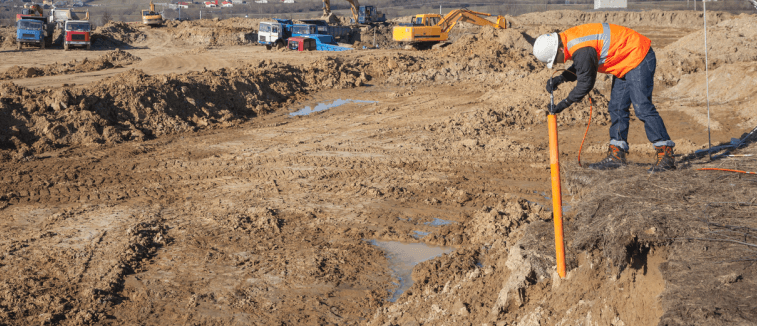Top Reasons to Hire a Geotechnical Specialist for Your Construction Projects
Top Reasons to Hire a Geotechnical Specialist for Your Construction Projects
Blog Article
The Significance of Geotechnical Engineering in Attending To Environmental Challenges and Enhancing Building And Construction Security
Geotechnical engineering functions as a keystone in the crossway of environmental stewardship and building safety and security, supplying important understandings right into the behavior of soil and rock under different problems. This self-control not just addresses pressing ecological difficulties such as soil erosion and groundwater security yet also enhances the toughness of facilities versus all-natural threats. By carrying out tactical website investigations and tailored mitigation actions, geotechnical designers play a crucial function in safeguarding both human lives and ecological integrity. Yet, the intricacies of these difficulties increase essential questions about the future instructions of this area and its ramifications for sustainable advancement.

Role of Geotechnical Design
Geotechnical engineering plays a crucial duty in the layout and building of infrastructure by attending to the habits of soil and rock products under various problems. This area of design is crucial for understanding the communication in between frameworks and the ground, that includes establishing the load-bearing ability of dirt, examining stability, and predicting potential negotiation or failure.
Geotechnical engineers are accountable for performing website investigations, which involve sampling and testing soil and rock to collect data on their physical and chemical residential properties. This information is essential for creating foundations, retaining wall surfaces, and other earth-retaining structures that make certain security and durability. Furthermore, geotechnical design notifies the selection of proper building approaches and materials, thereby decreasing threats related to soil behavior.
Moreover, the integration of geotechnical design principles into urban preparation and environmental administration is critical for addressing obstacles such as ground contamination and groundwater monitoring. By recognizing geotechnical elements, designers can establish sustainable solutions that improve the strength of facilities versus all-natural dangers, while additionally promoting ecological stewardship. Eventually, the duty of geotechnical engineering is important for achieving secure, sturdy, and environmentally aware construction techniques.
Soil Disintegration Mitigation
Soil disintegration poses a substantial danger to both environmental security and framework honesty, impacting about 24 billion lots of productive soil shed yearly worldwide. This phenomenon is exacerbated by variables such as deforestation, urbanization, and poor agricultural methods. Geotechnical engineering plays a critical duty in creating reliable soil disintegration mitigation approaches that safeguard both the setting and building and construction jobs.
One strategy entails the application of erosion control approaches such as plants growing, which stabilizes soil with origin systems. Additionally, the construction of keeping terraces and walls can efficiently lower surface area runoff and secure prone areas from disintegration. Appropriate drain layout is additionally vital; it reduces water build-up and directs excess drainage far from crucial structures.
Additionally, geotechnical engineers use soil stabilization methods, such as the application of geotextiles and biodegradable mats, to improve dirt communication and prevent degradation - about geotechnical engineering. Routine monitoring and analysis of erosion-prone sites make it possible for timely interventions, ensuring lasting sustainability. By incorporating these techniques, geotechnical engineering not only reduces the effects of dirt disintegration however likewise contributes to the strength of infrastructure versus environmental difficulties, ultimately promoting Find Out More a safer and a lot more lasting constructed atmosphere
Groundwater Defense Strategies
Groundwater functions as a crucial resource for drinking water, agriculture, and commercial procedures, making its security important for environmental sustainability and public health. Effective groundwater protection methods are critical in minimizing contamination dangers and ensuring the longevity of this source.

Routine surveillance of groundwater quality is additionally vital, enabling early discovery Discover More Here of contamination resources and helping with prompt remediation efforts. Utilizing innovative modern technologies, such as geophysical studies and remote sensing, help in determining potential threats to groundwater reserves.
Additionally, public education and learning and stakeholder engagement are crucial, fostering neighborhood assistance for groundwater protection initiatives. geotechnical companies in south africa. By combining regulatory actions, technical improvements, and neighborhood participation, we can produce an extensive structure that safeguards groundwater sources while promoting sustainable advancement and building and construction practices
Landslide Risk Administration
Landslides posture substantial risks to both human safety and facilities, making reliable threat administration strategies important. Geotechnical engineering plays an important duty in determining, analyzing, and mitigating landslide dangers. An extensive understanding of slope security, dirt technicians, and hydrology is important for developing effective risk management strategies.
The very first step in landslide risk management includes complete site examinations, which include geological mapping and soil screening. These investigations assist engineers evaluate the potential for landslides by determining critical elements such as incline angles, soil make-up, and water web content. Utilizing advanced innovations such as remote noticing and geophysical surveys can improve the accuracy of these evaluations.
As soon as risks are determined, proper mitigation steps can be applied. These may consist of engineering remedies such as keeping wall surfaces, drain systems, and incline stabilization strategies. Checking systems ought to be developed to find indications of ground motion and adjustments in water degrees, enabling for proactive interventions.

Enhancing Construction Safety
Construction websites often provide a myriad of threats that can jeopardize worker security and project stability. Geotechnical engineering plays a vital duty in boosting building and construction safety and security by providing important understandings right into subsurface problems. With detailed soil and rock evaluation, geotechnical designers can recognize prospective dangers, such as dirt instability, groundwater issues, and seismic susceptabilities, which may compromise the safety of building activities.
Carrying out geotechnical options, such as correct structure style and the usage of retaining structures, mitigates these threats dramatically. These services not just make certain the security of the frameworks being constructed yet likewise create a more secure working atmosphere for building and construction workers.
Furthermore, promoting a culture of safety via training and adherence to developed safety and security methods further boosts construction website safety and security. By incorporating geotechnical competence right into the preparation and execution stages, building jobs can achieve greater safety criteria, ultimately protecting employees and making sure successful project conclusion.
Conclusion
In verdict, geotechnical engineering serves as a critical discipline in promoting and tackling environmental obstacles building and construction security. Via effective soil disintegration reduction, groundwater defense techniques, and landslide danger monitoring, geotechnical designers contribute to the growth of resilient facilities.
Geotechnical engineering serves as a cornerstone in the junction of environmental stewardship and building safety, providing vital insights into the habits of soil and rock under numerous conditions. Geotechnical design notifies the choice of appropriate building and construction methods and products, thus decreasing dangers associated with dirt actions.
Geotechnical engineering plays a critical role in developing reliable soil erosion mitigation methods that protect both the atmosphere and construction projects.
Moreover, geotechnical engineers utilize dirt stablizing techniques, such as the application of geotextiles and naturally degradable floor coverings, to boost soil cohesion and prevent destruction. Via comprehensive dirt and rock analysis, geotechnical designers can determine prospective dangers, such as soil instability, groundwater issues, and seismic susceptabilities, which may jeopardize the security of building and construction tasks.
Report this page